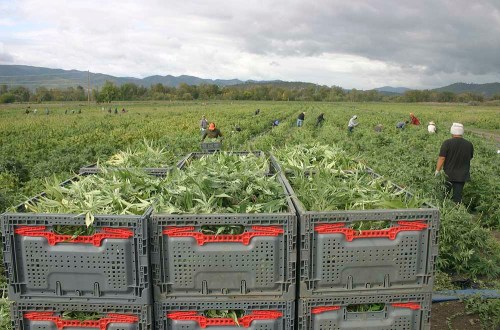Oregon senators weigh in on USDA interim hemp rule
Published 3:00 pm Friday, November 22, 2019

- Several hundred field workers pick hemp flowers on a late September morning at Hemptown USA’s Oregon farm in Central Point. Oregon’s senators are urging the USDA to change testing standards in its interim hemp rules.
WASHINGTON, D.C. — Oregon’s two U.S. senators are probing the USDA over what they describe as “unintended and potentially harmful effects” of the agency’s interim hemp rule, which was released last month.
In a letter sent Nov. 20 to Secretary of Agriculture Sonny Perdue, Sens. Ron Wyden and Jeff Merkley outlined concerns raised by farmers, researchers and regulators that could impact industrial hemp production in Oregon and across the country.
Hemp was fully legalized in the 2018 Farm Bill and defined as an agricultural commodity. Lawmakers ordered the USDA to come up with regulations for growing and testing the versatile crop.
By definition, hemp cannot contain more than 0.3% tetrahydrocannabinol, or THC, the psychoactive component in cannabis that gets users high.
The USDA rule allows hemp growers to access federal programs that were previously off limits, such as crop insurance and farm loans. But the program also contains stricter requirements for growing hemp than the Oregon Department of Agriculture’s pilot program, which has worried local producers.
Wyden and Merkley, both Democrats, are outspoken advocates for hemp. They worked across the aisle with Senate Majority Leader Mitch McConnell, R-Ky., to pass the Hemp Farming Act of 2018, removing hemp from the list of Schedule I drugs.
Legalization prompted an explosion of the crop across Oregon in 2019, with more than 63,000 registered acres statewide compared with 11,754 acres in 2018. The senators are now asking the USDA to modify several provisions in the interim guidelines to avoid hampering the hemp industry.
Under the rule, growers are required to test hemp plants for THC levels within 15 days of anticipated harvest. Wyden and Merkley wrote they are very concerned that does not provide enough time for farms, and encouraged the USDA to adopt Oregon’s standard for crop testing within 28 days of harvest.
The senators also asked the USDA drop its requirement that all hemp testing be done solely at labs registered by the U.S. Drug Enforcement Administration, which they wrote could cause “tremendous bottlenecks and unnecessary delays” for producers.
A major issue for growers centers on the specific methods for testing THC levels in hemp. In Oregon, testing has been done for “delta-9” THC alone under the 0.3% limit.
However, the USDA wants to change the standard to measuring “total THC,” taking into account another compound known as tetrahydrocannabinolic acid — or THCA — that converts into mind-altering delta-9 THC when applied to heat.
If the change is made, it means some cannabis that qualified as hemp in previous years might now exceed the 0.3% threshold and would need to be destroyed.
According to Wyden and Merkley, “We believe strongly that this is a complete reversal of the congressional intent expressed in that law, and requires testing that Congress specifically did not include.” They asked the USDA to remove all requirements for “total THC,” and allow testing for delta-9 TC that does not involve applying heat.
Finally, the USDA interim rule states farmers can be found negligent if their hemp crop exceeds 0.5% THC. This is meant to deter producers who would intentionally try to grow illegal marijuana plants under the guise of the Hemp Production Program.
Wyden and Merkley argue that is a far too low and arbitrary number, requesting the negligence threshold be greater than 1% THC.
“A reasonably prudent hemp producer could take the necessary steps and precautions to produce hemp, such as using certified seed, using seed that has reliably grown compliant plants in other parts of the country and engaging in other best practices, yet still produce hemp plants that exceed this 0.5% THC concentration,” they wrote.
In their letter, the senators thanked the USDA for its rulemaking, and said they look forward to careful consideration of their recommendations.
“Farmers in Oregon and across the country are on the precipice of an agricultural boom that, with the right regulatory framework, stands to boost rural economies in every corner of the country,” they wrote.









